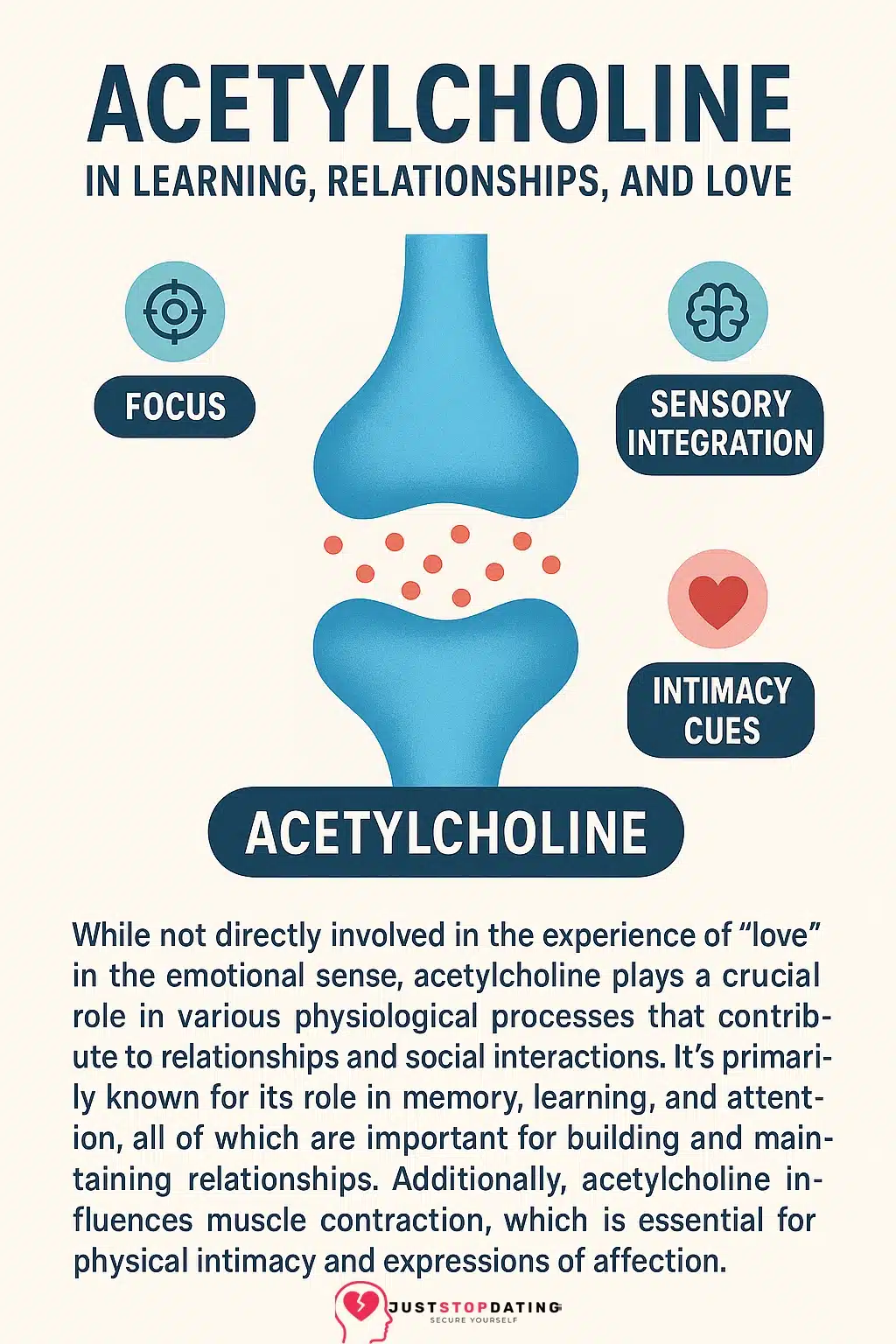Acetylcholine is a neurotransmitter involved in attention, learning, memory, and sensory responsiveness. In the context of relationships and dating, acetylcholine plays a critical role in sustained focus, emotional encoding, and the regulation of parasympathetic nervous system functions—such as calmness and intimacy. It influences how individuals attend to and process emotionally salient cues during early relational bonding.
Acetylcholine
| |
|---|---|
| Common Phrase | Acetylcholine |
| Core Characteristics | Attention regulation, memory encoding, parasympathetic activation, sensory tuning |
| Associated Traits | Focus during bonding, calm alertness, emotional sensitivity, sensory awareness |
| Behavioral Indicators | Sustained eye contact, responsive listening, somatic calmness in safe relationships |
| Contrasts With | Dopamine-driven novelty seeking, cortisol-driven threat response, adrenaline arousal |
| Associated Disciplines | Neuroscience, psychopharmacology, cognitive psychology, behavioral science |
| Cultural Relevance | Increasingly referenced in neurodiversity, attention, and intimacy-related research |
Definition
Acetylcholine is a key neurotransmitter that facilitates cognitive focus, learning, and restful states through the parasympathetic nervous system. In emotional and relational contexts, it underpins states of calm attentiveness—supporting safety cues, eye contact, emotional attunement, and memory consolidation during intimacy. It balances arousal and regulation, making it vital to emotional presence in early-stage attraction and bonding.
Other Names
ACh, cholinergic transmitter, parasympathetic neurotransmitter, focus molecule, neuromodulator of attention
History
1910s: Discovery in Frog Hearts
British physiologist Henry Dale identified acetylcholine in 1914 as a chemical involved in slowing heart rate, laying the groundwork for neurotransmitter theory.
1930s: Confirmed as a Neurotransmitter
Otto Loewi’s experiments demonstrated chemical transmission between nerves. He and Dale jointly received the 1936 Nobel Prize in Physiology or Medicine.
1950s–1970s: Cholinergic System Mapping
Scientists began mapping cholinergic neurons in the brain, revealing roles in memory, sleep, and sensory processing.
1980s–1990s: Alzheimer’s Research
Low acetylcholine was linked to cognitive decline in Alzheimer’s disease, spurring treatments like cholinesterase inhibitors to prolong memory function.
2000s–Present: Role in Emotion and Focus
Modern research highlights acetylcholine’s influence on micro-attention, emotion regulation, and intimacy. Studies now examine its role in social cognition and trauma recovery.
Cultural Impact
Attention Economy and Burnout
Acetylcholine is part of a neurobiological counterbalance to overstimulation. Cultural conversations around burnout, overstimulation, and ADHD have increased focus on this transmitter.
Neurodivergent Intimacy
Therapists and educators working with autistic and ADHD populations highlight acetylcholine’s role in sensory sensitivity and social regulation during romantic interactions.
Biology
Cholinergic Pathways
Produced in the basal forebrain and brainstem, acetylcholine modulates activity in the hippocampus, cortex, and thalamus—affecting learning, sleep, attention, and emotional memory formation.
Parasympathetic Nervous System
As the chief neurotransmitter of the parasympathetic system, acetylcholine slows heart rate, lowers blood pressure, and promotes social safety cues essential for connection.
Neuroplasticity and Learning
It enhances synaptic plasticity, helping individuals learn from emotionally significant moments—whether a first date, a betrayal, or an expression of affection.
Psychology
Sensory Processing and Safety
Acetylcholine helps regulate sensory input, enhancing ability to feel emotionally safe in close proximity and reducing hypervigilance. It’s essential in co-regulation and intimacy.
Micro-Attention and Presence
Unlike dopamine’s focus on novelty, acetylcholine supports subtle noticing: changes in tone, facial expression, and body language—all critical in early bonding.
Sociology
Intimacy and Regulation Norms
Social rituals that promote eye contact, touch, and vulnerability depend on neuromodulators like acetylcholine. Cultural scripts about “calm presence” are partly neurochemical expectations.
Depictions in Media
Television Series
- “The Midnight Gospel” (Netflix, 2020) – A psychedelic reflection on emotional presence and awareness, implicitly tied to cholinergic modulation during sensory overload.
Films
- “Her” (2013) – Theodore’s deep, attentive connection with an AI reflects heightened sensitivity and presence, echoing acetylcholine’s emotional attentiveness.
Literature
- “The Body Keeps the Score” by Bessel van der Kolk (2014) – Discusses how safety and emotional regulation (partially mediated by acetylcholine) are foundational to trauma recovery and healthy relationships.
Visual Art
Visual motifs that emphasize softness, stillness, and attentiveness—such as quiet portraiture or intimate moments—mirror acetylcholine’s role in sensory intimacy and focused connection.
- “Mother and Child” by Mary Cassatt (1890) – A visual representation of cholinergic calm: mutual gaze, close contact, and regulated presence.
Publications
Research on acetylcholine spans neurobiology, psychiatry, and behavioral science. Key topics include attention regulation, intimacy, trauma processing, emotional safety, and neurodivergence.
Research Landscape
Acetylcholine is widely studied in neuroscience, particularly in relation to attention, memory, and parasympathetic regulation. Emerging areas of research explore its role in emotional regulation during romantic bonding, attachment formation, trauma recovery, and social cognition in neurodiverse populations.
- Masculinity Crisis Turns Emotional Silence Into MisogynyPublished: 2025-05-04 Author(s): Dr. Mel Barclay
- Stay Away from the 5P’s: Pilots, Physicians, and Police…Are Risky PartnersPublished: 2025-05-03 Author(s): Dr. Mel Barclay
- AMPCliff: Quantitative definition and benchmarking of activity cliffs in antimicrobial peptidesPublished: 2025-05-03 Author(s): Kewei Li
- Understanding facilitators and barriers to genetic testing for black ovarian cancer patients: A qualitative study utilizing interview data with patients and providersPublished: 2025-05-03 Author(s): Chelsea Salyer
- The future of HIV diagnostics: an exemplar in infectious diseasesPublished: 2025-05-03 Author(s): Nitika Pant Pai
FAQs
Is acetylcholine linked to romantic attraction?
Indirectly. While it doesn’t create desire, it supports emotional focus, attunement, and calmness—factors that increase bonding and perceived connection.
How does acetylcholine affect dating experiences?
It helps individuals stay emotionally regulated and attentive in social settings, enhancing perception of subtle relational cues and supporting co-regulation.
Is acetylcholine relevant to ADHD or neurodivergent dating?
Yes. Dysregulation of acetylcholine can affect attention and sensory modulation. Some ADHD and autistic individuals benefit from strategies that support cholinergic tone during intimacy.
Can I increase acetylcholine naturally?
Choline-rich foods (like eggs), mindfulness practices, sleep, and reducing overstimulation may support healthy acetylcholine levels. Always consult a medical provider for clinical concerns.





